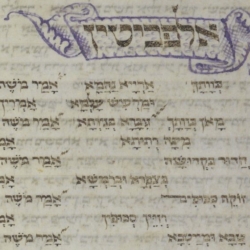Since the use of targum became a special rare occasion, Jews did what we do for special rare occasions — we write piyyutim. An extensive series of Aramaic piyyutim were written, to be inserted into the recitation of the targum (or the ‘seder meturgeman’) itself. On Shavuot, a massive series of piyyutim, one for every one of the ten commandments and then some, were written. On Pesaḥ, a similar number of piyyutim were composed for important moments.
Since the mass acceptance of the Shulḥan Arukh, the custom of the recitation of the targum on these special days has been lost from Ashkenazi practice, and as a consequence the vast majority of the seder meturgeman piyyutim themselves have been abandoned. A small number of Shavuot seder meturgeman piyyutim are still in use (specifically, Aḳdamut Milin and Yetsiv Pitgam), but taken out of their original context. (As an example, why do we read Yetsiv Pitgam after the first verse of the haftarah? Because it’s meant to introduce the targum!)
I personally love Aramaic, piyyutim, and liturgy, so I’ve taken it upon myself to translate a selection of seder meturgeman piyyutim. This piyyut, Elaha Taqifa (Mighty God), the third in a series of Aramaic piyyutim from the seventh day of Pesaḥ, is meant to be recited after the concluding verse of the second aliyah (third on Shabbat). The translation preserves the alphabetical acrostic, as well as the authorial tag — Jequtiel son of Joseph.
| Source (Armaic) | Source (English) |
|---|---|
אֱלָהָא תַּקִּיפָא רַבָּא וְגִבָּרָא בְּרִיךְ שְׁמֵיהּ וּמְרוֹמָם בְּכָל דָּרָא וְדָרָא גְּבוּרְתֵּיהּ עָבֵיד לָן בְּכָל סְטַר וּבְכָל אַתְרָא דַּבָּרָא וְרָעֲיָא מְהֵימְנָא לְנַטָּרָא |
Ah, powerful, great, and mighty God, Blessed be the Name, exalted over each generation! Causing mighty deeds for us with every enemy and every place Dutifully leading, shepherding, and guarding |
הֲוֵינַן בְּמִצְרַיִם בְּפוּלְחַן חֻמְרָא וְאִיתְגְּלֵי בִּגְבוּרְתֵּיהּ וּבְנֵיהוֹר יְקָרָא זֵיהוֹר כְּלִיל שִׁבְחֵיהּ בְּגוֹ אֲסַנָּא זְהִירָא חַסִּינָא וְקַדִּישָׁא שַׁדּוֹלֵי בְּצַעֲרָא |
Egypt-dwellers we were, laboring in clay, For then in divine might and the Presence’s glow was revealed, Glowing, the crown of praise in the midst of the glowing thornbush. How empathetic to our pain was the Strong and Holy One! |
טֵיבוּתֵיהּ לְעַמֵּיהּ עַמ חַבִּיב לְהוֹן קְרָא יְהַב לְהוֹן בְּמִפַּקְהוֹן רַבְרְבָנוּת עוּתְרָא כַּד נְפַקוּ וּסְלִיקוּ בְּרֵישׁ גְּלִי לְגַבָּרָא לְהוֹן בְּזַע יַמָּא אוֹרְחָא לְאִיתְיַשָּׁרָא מְטַיְּלֵי בְּיַמָּא דְסוּף מַרְגְּלָן לְצוֹבָרָא נָקְטִין וּמְכַנְּשִׁין בְּלָא יָכֵיל לְסוֹבָרָא |
In divine mercy, God called to the treasured people. Just as they left, giving them great wealth, Keeping, when they left and arose, pride to victory Lopping and straightening a path through the sea for those Making their way through the Red Sea, gathering pearls Near-endlessly collecting beyond what they could carry. |
סַחְרָנוּת אָזְלִין לָא צָבַן לְאִיתעֲקָרָא עַד דְּאַטֵּיל יַתְהוֹן הֵימָן רָב סָפְרָא פָּארָן אִתְפְּנִיאוּ שְׁכִינְתָּא עִמְּהוֹן שָׁרָא צְבִירִין וּמִתְכַּנְּשִׁין בְּחִיבְּתָא יַתִּירָא קַבּוֹלֵי פּוֹמְבֵּי אוֹרָיתָא סְבִירָא רְבוּתָא דְפָרִיקִי הֲוָת תַּמָּן סְדִירָא |
On and on they went, not desiring to be moved. Presently, Heman (Moses) the great scribe, made them disembark. Queuing up, the Presence among them, they turned to Paran (Sinai). Rallying and gathering with overflowing affection, So as to publicly receive the taught Torah, There the glory of my Rescuer was arrayed! |
שְׁבַח כִּתְרֵי תָגֵי בְּרֵישׁ כָּלחַד בְּשׁוּפְרָא תְּחוֹת נַעֲבֵד וּנְקַבֵּל בְּפוּמְּהוֹן לְאִתְאֲמָרָא יַחֵית לְהוֹן מַנָּא בַּחֲקַל וּבְמֵישְׁרָא קָרִיבִין וּמְנַסְּבִין לְגוּלְגֻּלְתָּא עוּמְרָא וּבֵיהּ טַעֲמִין שִׁתִּין בַּאֲרָמוּת סִידרָא תַּפְנוּקֵי מַלְכִין אָכְלִין בְּכָלסִיתְרָא |
Upon each head two beautiful glorious crowns were set Vis-a-vis the “We will do and hear” spoken in their mouths. Whether in field or camp, raining manna upon them, eXtracting an ‘omer for each head’s worth. Yet increasing its value, it had sixty flavors within it. Zesty foods fit for a king eating on every side. |
יָאוּת יְקָר אַרְבְּעָא דִיגְלֵיהוֹן בְּמַדְבְּרָא אֲבָהָתָא דְעָלְמָא שְׁמַהָן בְּהוֹן לְסַדָּרָא לְדִגְלָא קַדְמָאָה אַיַ״י גְּלוּף סִיתְרָא בְּתִינְיָנָא בֶּצַ״ע יְהִיב בְּהַדרָא רְשִׁימָא תְּלִיתָאָה רֲחַ״ק פְּרִישׁ סְבָרָא יְצָיְרֵי אָתֵי מָקָ״ב רְבִיעָאָה לְמֵימְרָא |
JEtting across the sky, in sheer beauty were their four flags QUartered among them were the names of the forefathers.[1] The names of Abraham, Isaac, and Jacob, all of which are four letters in the Hebrew, are spelled out, letter by letter, in the next four lines. THIs was found on the first: Alef-Yod-Yod, ordained in secret ELucidated on the second: Bet-Tsadi-’Ayin, given in splendor. JOined with the third: Resh-Ḥet-Qof, explicit and understandable. SEt in skill: Mem-Qof-Bet, the fourth, so to say. |
וּמֵאַב סַגִי עַמִּין אָתָא מִשְׁתָּאֲרָא פְּרִישָׁן מִילַּיָּא בְּטַעֲמָא יַקִּירָא חָלְפָא וּמִיַּתְּבָא בְּמַשְׁרִיתָא קְטִירָא זְמִינָא בְּשִׁבְחָא עֲנָנָא כְעֵין כִּיתרָא קִיּוּמָא וְתוּקְפָּא אֲלִיפָא בְּסִפְרָא |
PHiloprogenitive Abraham left the sign SONorously and sweetly explaing the matter BEing in the fortified camp, crossing about, STalwart, becrownedly, welcomed in the glorious cloud, RObust and stroNG, learned in books. |
וּבְאִיסְתַּלָּקוּת עֲנָנָא דִנְהוֹרָא אַלִּימוּת מִילְּתָּא צְהִירָא לְצַיָּרָא בְּמִילֵּי אוֹרָיְתָא יָאֵה וְשׁוּפְרָא כְּדִכְתִּיב וַחֲתִים וְכִדְמוֹכַח לַן קְרָא לָא עָדֵי עַמּוּדָא דַעֲנָנָא תְּדִירָא |
ANDin going up to the cloud of light, BRightening the matter to make it AVailable. Be beautified in good with the Torah, Engaging in what was written and sealed, and what we should read: The cloud-pillar did not depart by day… |
Notes
| 1 | The names of Abraham, Isaac, and Jacob, all of which are four letters in the Hebrew, are spelled out, letter by letter, in the next four lines. |
|---|

“אֱלָהָא תַּקִּיפָא רַבָּא וְגִבָּרָא | Elaha Taqifa (Mighty God) — a piyyut for the Seder Meturgeman of the 7th Day of Pesaḥ by Yequtiel ben Yosef” is shared through the Open Siddur Project with a Creative Commons Attribution-ShareAlike 4.0 International copyleft license.










Leave a Reply